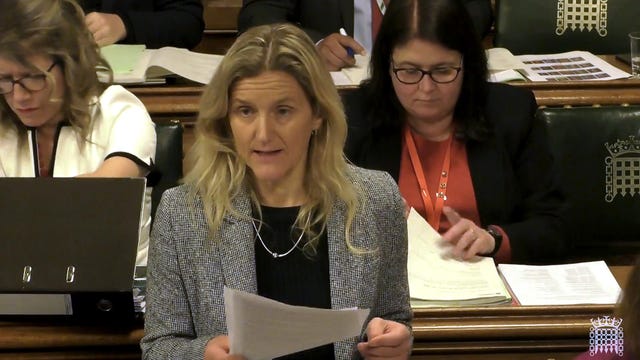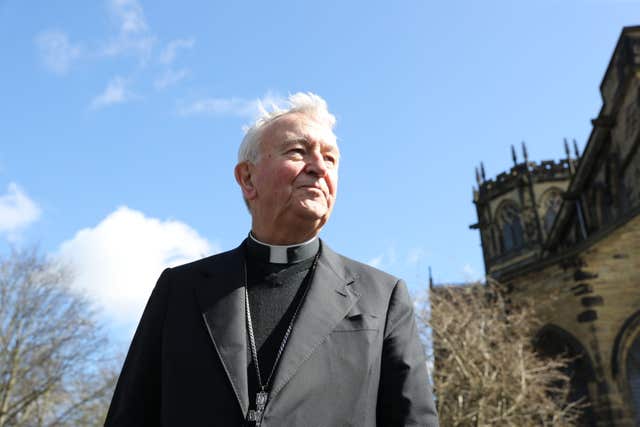Assisted dying Bill once-in-a-lifetime chance for change, says former prosecutor
The Terminally Ill Adults (End of Life) Bill returns to the House of Commons this month for further debate.

The assisted dying Bill is a “once-in-a-generation opportunity” to bring about much-needed change, a former top prosecutor has said, as the MP behind the proposed legislation dismissed criticism of the scrutiny process as “utter nonsense”.
Sir Max Hill, a former director of public prosecutions who has previously spoken in support of legalising assisted dying, warned against “kicking this can down the road” ahead of the next major vote on the Bill.
The Terminally Ill Adults (End of Life) Bill returns to the House of Commons this month for further debate.
It follows a two-month committee process hailed by supporters as having strengthened proposed legislation and made it more workable, but which opponents have claimed was rushed and chaotic.
MPs are expected to vote on further amendments to the Bill at report stage on April 25.
If time allows, MPs could also vote on whether to approve the Bill at third reading – its final stage in the Commons – and decide if it is then sent to the House of Lords for further scrutiny.
Labour’s Kim Leadbeater said MPs have a “duty as parliamentarians to change the law now”, when asked about the prospect of her Bill not passing.
She was asked about suggestions an attempt to change the law could return in the form of a royal commission or Government legislation, should MPs vote against her Bill in the coming weeks.
Referring to the last time an assisted dying Bill was debated and voted on in the Commons in 2015, which ended in defeat, she said it would be “such a tragedy” if the conversation ended now and the subject was not revisited for another decade.
She said: “What worries me is, if the Bill doesn’t pass, the conversation ends, and that would be really dreadful for so many people, for so many reasons.”
The Bill, which passed at second reading in November in a historic vote, will come back to MPs in the Commons significantly changed.
The High Court safeguard has been dropped and replaced by expert panels, while the implementation period has been doubled to a maximum of four years for an assisted dying service to be in place should the Bill pass into law.
Eligibility remains with only terminally ill adults in England and Wales with fewer than six months to live.
The Bill proposes someone fitting this criteria should be legally allowed to end their lives, subject to approval by two doctors and an expert panel featuring a social worker, senior legal figure and psychiatrist.

Speaking at a press conference on the Bill which has been republished to incorporate the series of amendments made at committee stage, Sir Max said: “It’s a once-in-a-lifetime opportunity, a once-in-a-generation opportunity, for parliamentarians of 2025 to say that – with all respect to where their predecessors were 60 years ago – they have found a better way which is going to improve the outcome for some of the most vulnerable people in society without … opening the door to a gradual broadening of the categories of people to whom this Act applies.”
He said the “dial has turned” in the public debate on the issue, adding: “We cannot go back”.
Sir Max added: “There is time for anyone on receipt of the republished Bill to really consider it carefully – kicking this can down the road really is no solution for anybody.”
Ms Leadbeater described criticism of the scrutiny process of her Bill, including that it would be rushed and not be subject to proper debate or amendments, as “utter nonsense”.
She said: “We have spent hours and hours and hours on this work. Colleagues have dedicated huge amounts of time and energy to this, and we’ve now got important changes to make the Bill stronger. And I hope today that is very clear for everybody to see.”
As well as criticism from MPs opposed to the Bill, the leader of Catholics in England and Wales has criticised the “deeply flawed process” by which he said the Bill was progressing through Parliament.

In a letter, which will be read in the parishes of Westminster archdiocese this weekend, he wrote: “At this point we wish not simply to restate our objections in principle, but to emphasise the deeply flawed process undergone in Parliament thus far.
“We wish to remind you that it is a fundamental duty of every MP to ensure that legislation is not imposed on our society which has not been properly scrutinised and which will bring about damaging consequences.”
Another amendment voted through in committee imposes a duty on a secretary of state in England and gives power to ministers in Wales, where health is devolved, to ensure the provision of voluntary assisted dying services.
In his letter, Cardinal Nichols asks: “Would this mean the establishment of a ‘national death service’?”
Former MP Caroline Ansell, who is now director of advocacy and policy at Christian Action Research and Education, said: “Ms Leadbeater has claimed that if her Bill falls, the ‘conversation’ about assisted death ends.
“This is not about having a conversation. This Bill would institute a fundamental, and highly controversial, change to the NHS to allow delivering death to be part of commissioned services.
“We need to have a better conversation about truly life-affirming forms of support for dying people. The UK can do better than assisted suicide.”
MP and disability rights advocate Marie Tidball, who was on the scrutiny committee, secured amendments to ensure the establishment of independent advocates to support people with learning disabilities, autism or mental health conditions and to set up a disability advisory board, should the Bill become law, to advise on its implementation and impact on disabled people.
She said her yes vote last November had been conditional on feeling assured that safeguards would be strengthened through the committee, and that she will be voting in favour at third reading.
She told the press conference: “I can say, as someone who has looked at legislative scrutiny over the course of the last 20 years, this is the most extraordinary, deliberative cross-party process I’ve ever seen.”
An impact assessment is expected to be published before the Bill returns to the Commons, with a minster previously saying efforts are being made to ensure MPs have “ample time” to look at it in advance of their next vote.
Impact assessments look at economic, social and environmental impacts of Bills, including the likely costs and benefits and the associated risks.
Health Secretary Wes Streeting has previously suggested it could cost the NHS more if assisted dying is brought in.





